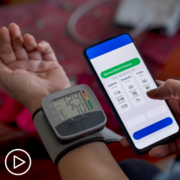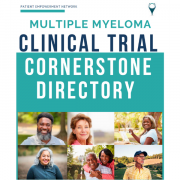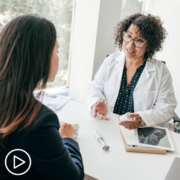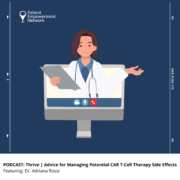Monitoring Health After CAR T-Cell Therapy | What to Expect
Monitoring Health After CAR T-Cell Therapy | What to Expect from Patient Empowerment Network on Vimeo.
When does immune system function return to normal following CAR T-cell therapy? Dr. Adriana Rossi discusses how patients are monitored after the process, the expected recovery time for blood counts, and the importance of communication with your healthcare team at all times.
Dr. Adriana Rossi is co-director of the CAR T and stem cell transplant program at the Center for Excellence for Multiple Myeloma at Mount Sinai Health System in New York City. Learn more about Dr. Rossi.
See More From Thrive CAR T-Cell Therapy
Related Resources:
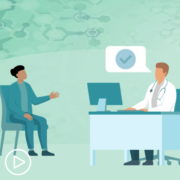
|

|

|
Transcript:
Katherine Banwell:
Is there a typical timeframe for the immune system function to return?
Dr. Adriana Rossi:
I would say a year is a good time but it’s a very unpredictable wave. So again, unlike stem cell transplant where you have a clear time where the cells are low, they recover, they stay recovered, we have noticed for some patients, they may have low blood counts just during the first month and then be recovered. Some will have no problems in the first month and it’s in the weeks to follow that suddenly either the reds, or the platelets, or the white count may need support.
And in very rare instances, out to a year, they’re still needing support, sometimes say a growth factor injection once a week.
Katherine Banwell:
So, how is it monitored over time?
Dr. Adriana Rossi:
We monitor all those different levels of the immune system. So, we check on the CBC, which is the very common blood counts. We also look at what is called a lymph panel to look at the different types of T cells and make sure that they are recovering. Those usually take about three to six months to recover. The white count, again usually by Day 30, but there are some cases of delayed recovery. And the immunoglobulins, which is the antibody level, we also monitor monthly.
Katherine Banwell:
What other side effects should patients who are considering CAR T-cell therapy be aware of?
Dr. Adriana Rossi:
Really, those are the big three. I would say others are very rare but the low blood counts is the one that lasts beyond the time in the hospital. And the rare neurotoxicities that are delayed.
Katherine Banwell:
When should patients mention any issues they’re experiencing to their healthcare team?
Dr. Adriana Rossi:
Always. That is a very, very, short answer. Please don’t ever think you are bothering the doctor. I hear that a lot. “Oh, I didn’t want to bother you.” It is never a bother. This is why we are here. So, anything that is happening that is out of the ordinary, please let your healthcare provider know. If it is not something that needs our attention or we don’t need to worry about, we will tell you.
Katherine Banwell:
Better safe than sorry.
Dr. Adriana Rossi:
Always.
Katherine Banwell:
And how does a care partner factor into the process? It seems having a good support system is essential.
Dr. Adriana Rossi:
It absolutely is. I think the entire journey of myeloma really is what I would consider a team sport. It is not something we go through alone. And the more members of the team you have the better. So, as your medical team, we always value the caregivers. For CAR T specifically, since there is this concern for infections and neurotoxicity, caregivers are really essential.
They should be well informed, know what to look for, and be the ones to reach out to us if anything is concerning. Again, any symptoms out of the ordinary, any fever, and really be a part of communicating with the medical team.
Katherine Banwell:
Is there a period where patients are considered out of the woods from CAR T side effects?
Dr. Adriana Rossi:
Hard to say. Again, I like to emphasize that most patients by Day 30 or 60 are back to work, are feeling themselves, are recovered. Another contrast to stem cell transplants. It’s a much faster recovery. I have patients who within 30 days are eager to go back to work and don’t know what I was talking about or why I insist on seeing them so much.
But some patients, again, out to a year, may still be requiring visits for support in either the IVIG for the immunoglobins, growth factor support for their counts. So, there are outliers at both extremes. We follow the model of 100 days for recovery.
Katherine Banwell:
Do some patient types do better than others?
Dr. Adriana Rossi:
Well, always yes. And we are still endeavoring to figure out who they are and why that is. There are things that we don’t know, can’t predict. But things that we do recognize are again bringing patients whose myeloma is under good control.
So, instead of having a lot of disease or disease that is in a growth phase, we try to use the bridging therapy to optimize the patient, not only to improve the response, but also minimize the toxicities.
Katherine Banwell:
Does age have an impact at all?
Dr. Adriana Rossi:
Not as much. We actually have just finished an 88-year-old patient whose hospital course was remarkably unremarkable, as we would like. I think another difference from stem cells, it is not as rigorous. While each patient, I think, should be part of that decision and that conversation, reviewing what is now a growing number of options and see if it’s right for them as an individual. So, age is a consideration, but frailty will always be the more important.

